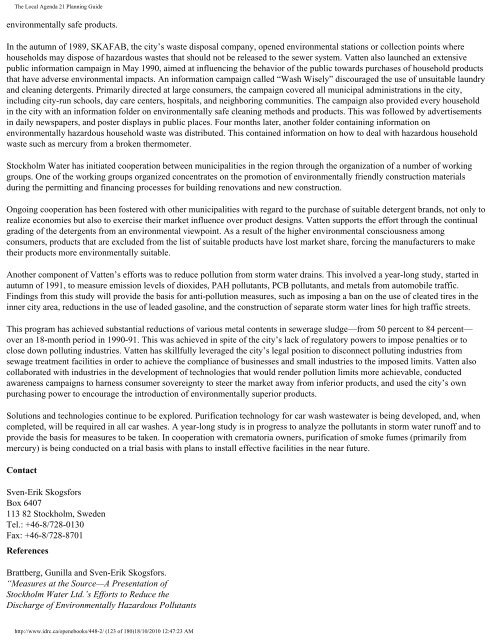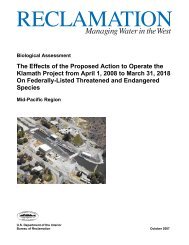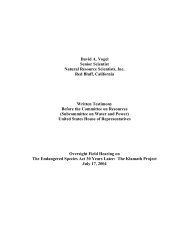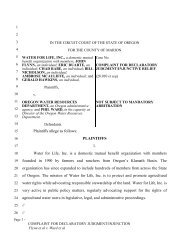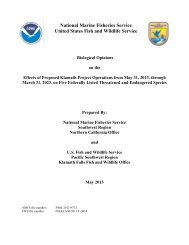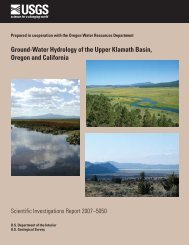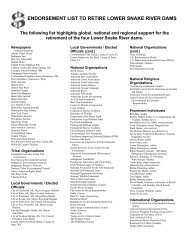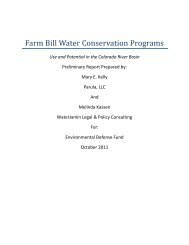The Local Agenda 21 Planning Guide - Democrats Against UN ...
The Local Agenda 21 Planning Guide - Democrats Against UN ...
The Local Agenda 21 Planning Guide - Democrats Against UN ...
You also want an ePaper? Increase the reach of your titles
YUMPU automatically turns print PDFs into web optimized ePapers that Google loves.
<strong>The</strong> <strong>Local</strong> <strong>Agenda</strong> <strong>21</strong> <strong>Planning</strong> <strong>Guide</strong><br />
environmentally safe products.<br />
In the autumn of 1989, SKAFAB, the city’s waste disposal company, opened environmental stations or collection points where<br />
households may dispose of hazardous wastes that should not be released to the sewer system. Vatten also launched an extensive<br />
public information campaign in May 1990, aimed at influencing the behavior of the public towards purchases of household products<br />
that have adverse environmental impacts. An information campaign called “Wash Wisely” discouraged the use of unsuitable laundry<br />
and cleaning detergents. Primarily directed at large consumers, the campaign covered all municipal administrations in the city,<br />
including city-run schools, day care centers, hospitals, and neighboring communities. <strong>The</strong> campaign also provided every household<br />
in the city with an information folder on environmentally safe cleaning methods and products. This was followed by advertisements<br />
in daily newspapers, and poster displays in public places. Four months later, another folder containing information on<br />
environmentally hazardous household waste was distributed. This contained information on how to deal with hazardous household<br />
waste such as mercury from a broken thermometer.<br />
Stockholm Water has initiated cooperation between municipalities in the region through the organization of a number of working<br />
groups. One of the working groups organized concentrates on the promotion of environmentally friendly construction materials<br />
during the permitting and financing processes for building renovations and new construction.<br />
Ongoing cooperation has been fostered with other municipalities with regard to the purchase of suitable detergent brands, not only to<br />
realize economies but also to exercise their market influence over product designs. Vatten supports the effort through the continual<br />
grading of the detergents from an environmental viewpoint. As a result of the higher environmental consciousness among<br />
consumers, products that are excluded from the list of suitable products have lost market share, forcing the manufacturers to make<br />
their products more environmentally suitable.<br />
Another component of Vatten’s efforts was to reduce pollution from storm water drains. This involved a year-long study, started in<br />
autumn of 1991, to measure emission levels of dioxides, PAH pollutants, PCB pollutants, and metals from automobile traffic.<br />
Findings from this study will provide the basis for anti-pollution measures, such as imposing a ban on the use of cleated tires in the<br />
inner city area, reductions in the use of leaded gasoline, and the construction of separate storm water lines for high traffic streets.<br />
This program has achieved substantial reductions of various metal contents in sewerage sludge—from 50 percent to 84 percent—<br />
over an 18-month period in 1990-91. This was achieved in spite of the city’s lack of regulatory powers to impose penalties or to<br />
close down polluting industries. Vatten has skillfully leveraged the city’s legal position to disconnect polluting industries from<br />
sewage treatment facilities in order to achieve the compliance of businesses and small industries to the imposed limits. Vatten also<br />
collaborated with industries in the development of technologies that would render pollution limits more achievable, conducted<br />
awareness campaigns to harness consumer sovereignty to steer the market away from inferior products, and used the city’s own<br />
purchasing power to encourage the introduction of environmentally superior products.<br />
Solutions and technologies continue to be explored. Purification technology for car wash wastewater is being developed, and, when<br />
completed, will be required in all car washes. A year-long study is in progress to analyze the pollutants in storm water runoff and to<br />
provide the basis for measures to be taken. In cooperation with crematoria owners, purification of smoke fumes (primarily from<br />
mercury) is being conducted on a trial basis with plans to install effective facilities in the near future.<br />
Contact<br />
Sven-Erik Skogsfors<br />
Box 6407<br />
113 82 Stockholm, Sweden<br />
Tel.: +46-8/728-0130<br />
Fax: +46-8/728-8701<br />
References<br />
Brattberg, Gunilla and Sven-Erik Skogsfors.<br />
“Measures at the Source—A Presentation of<br />
Stockholm Water Ltd.’s Efforts to Reduce the<br />
Discharge of Environmentally Hazardous Pollutants<br />
http://www.idrc.ca/openebooks/448-2/ (123 of 180)18/10/2010 12:47:23 AM


